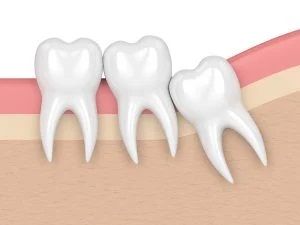What signs and symptoms are associated with an impacted tooth?

Symptoms associated with an impacted tooth include:
- Bleeding gums
- Tender gingiva
- Orofacial pain
- Aching jaw
- Difficulty opening and closing the mouth
- Halitosis (persistent bad breath)
Why do wisdom teeth become impacted?
Wisdom teeth are a third set of molars that arrive during early adulthood. Since the rest of a person’s teeth are well-established, there is normally not enough room for third molars to emerge through the gums properly. Instead they become stuck in the jaw and/or the gums.
An impacted tooth might point at an angle toward other teeth or the back of the mouth. In the rare instance that it is positioned upright, much of its structure is still trapped in the gums and/or the jawbone.
How can an impacted tooth affect my oral health?
There are a few ways that an impacted tooth negatively affects oral health. These teeth are susceptible to becoming abscessed. This is because if they are partially submerged in the gingiva, they are nearly impossible to keep clean. Surface debris and bacteria can become trapped beneath the gums and ultimately infect the tooth.
When an impacted tooth becomes infected, it can produce significant discomfort. The infection can also spread to neighboring teeth and the gingiva.
How do I know when it’s time to have my wisdom teeth removed?
Most people’s wisdom teeth begin to emerge between the ages of 17 and 25. Your dentist will look for signs of wisdom tooth arrival during routine checkups. When your dentist finds that your wisdom teeth have arrived, he or she will often recommend that you see an oral surgeon for their extraction.
If you’ve been referred to our practice for wisdom teeth removal, call our team at Charlottesville Oral Surgery and Dental Implant Center to reserve a consultation.